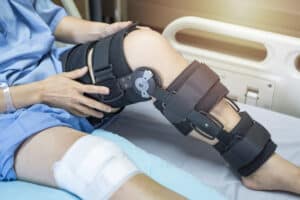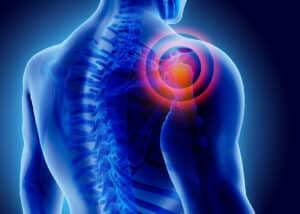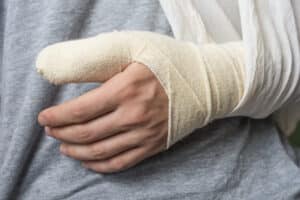 ☰ Menu
☰ Menu
Ski season is here. For many people along the Western Slope of Colorado, nothing is more exciting during the winter than a huge powder day. While skiing can be exhilarating, it’s also dangerous. The sports medicine team at Colorado Advanced Orthopedics sees a lot of patients every winter with serious ski injuries.
While you can minimize your risk of ski injuries by getting in shape, using the right gear and taking other precautions, there are some instances where these injuries are simply out of your control. Ski conditions are rarely perfect, visibility on the mountain is often poor during storms, and you cannot control the actions of other skiers who may be engaging in reckless, out of control behavior.
Part of being safe on the mountain is knowing the warning signs of common injuries. Below is a discussion of the most common ski injuries, and how they are typically treated.
Skiing is very demanding on your knees. Not only are your knees functioning as shock absorbers as you navigate uneven terrain (especially in the bumps), but the turning motions used can place stress on some of the major ligaments in the knee. Therefore, it should come as no surprise that knee injuries are some of the most common issues impacting skiers and snowboarders.
There are two primary knee injuries associated with skiing:

A common sign that you’ve suffered an ACL tear is a popping sound accompanied by pain and swelling. You may also experience tenderness and limited mobility in the knee joint.
In many instances, knee surgery will be required to repair your ACL injury. In addition, you will need to undergo extensive physical therapy as part of the rehab process. If you suffer a knee injury on the slopes, our orthopedics specialists can perform the diagnostic tests to identify whether it is an ACL tear, and our surgeons will recommend the appropriate treatment plan to help you restore full function.
The medial collateral ligament (MCL) runs along the inside of the knee, connecting your thighbone to your shinbone. The ligament plays a crucial role in controlling sideways motion, preventing your knee from bending inwards too far. This stabilizes the joint and maintains proper function of your knee. MCL tears can occur from a direct impact to the outside of the knee that causes your knee to push too far inward.
You will generally experience pain and swelling on the inside of the knee after an MCL tear. However, there is no popping sound with an MCL injury (one of the ways you can distinguish it from an ACL tear).
It’s crucial to visit an orthopedist or sports medicine specialist if you experience symptoms of an MCL tear. Our orthopedic surgeons can recommend the appropriate treatment course, which will generally include physical therapy and in severe injuries, surgery may be required.

Your rotator cuff consists of a group of tendons and muscles which help to stabilize the shoulder joint. Rotator cuff tears can occur during on out of control fall. You may experience dull, deep aching pain in the shoulder which makes it difficult to sleep. You may also experience reduced range of motion and develop arm weakness.
Depending on the severity of your rotator cuff injury, you may be able to restore full function with conservative treatments such as physical therapy and/or steroid injections. However, surgery may be necessary for severe injuries. Our orthopedic surgeons will recommend the best treatment plan based on the specific damage to your rotator cuff.
Another common injury occurring from a fall while skiing is a dislocated shoulder. This occurs when the upper arm bone pops out of the shoulder socket. Depending on the nature of the impact, your shoulder can dislocate in several different directions, including forward, downward or backward. This injury is typically accompanied by:
Prompt treatment is crucial after a dislocated shoulder. Our sports medicine specialists will need to place the arm back into the shoulder socket to reduce the pain. Repositioning the arm in the shoulder socket becomes more challenging as the swelling increases, which is why you want to seek treatment right away.
After the shoulder is repositioned, ice and anti-inflammatory pain medications such as ibuprofen can be used to reduce pain and swelling. You’ll need to keep your arm in a sling to ensure your shoulder stays immobilized. This will prevent additional injury. You may also need to perform stretching and strengthening exercises as part of the recovery process. In most instances, surgery will not be necessary.
Hand injuries are common among skiers and snowboarders. The type of injury you suffer generally depends on whether you are skiing or snowboarding.

Common symptoms after a skier’s thumb injury include:
Our orthopedic surgeons can treat your thumb injury. If the ligament is only partially torn, it may be possible to treat it without surgery. In this situation, your thumb will be immobilized for several weeks until it has healed. If the ligament is completely torn, surgery will typically be required to reattach the ligament.
While skiers typically suffer thumb injuries, snowboarders usually suffer wrist injuries. These commonly occur when putting your hands out to brace yourself from a fall. The pressure of your body landing on your wrist during a hard fall can result in a fracture. For this reason, beginning and intermediate snowboarders should always wear wrist guards.
Fractured wrists typically require a splint or cast for proper healing. You’ll also need physical therapy after the cast is removed.
The team of sports medicine specialists and orthopedic surgeons at Colorado Advanced Orthopedics have extensive experience treating a wide range of ski and snowboard injuries. Our team uses the latest and most advanced technology to diagnose your injury, ensuring that we’re able to recommend the best treatment plan to restore full function and a pain free life.
At Colorado Advanced Orthopedics, we’re committed to delivering the exceptional care you deserve. Our orthopedic surgeons are board certified and fellowship trained. This extensive training and experience allow us to provide the highest quality treatment available along Colorado’s Western Slope.
In addition, our team is committed to providing an amazing experience every step of the way. Our dynamic, caring team accomplishes this by listening carefully to your questions and concerns in order to ensure you understand your options before moving forward with treatment. We also make it a priority to communicate clearly and promptly with you, responding to phone calls as soon as possible. We offer flexible hours to meet your busy schedule, and you can expect shorter wait times during your visits to our medical center. If your treatment is being covered by insurance, our team will assist you with filing all paperwork to make the process as easy for you as possible.
Contact us today to schedule an appointment. Colorado Advanced Orthopedics serves patients in Meeker and throughout the White River Valley.
Subscribe to our monthly publication highlighting Life's Joy and getting back to your life. We feature health tips, being out and about, and bringing joy to daily life.
Subscribe